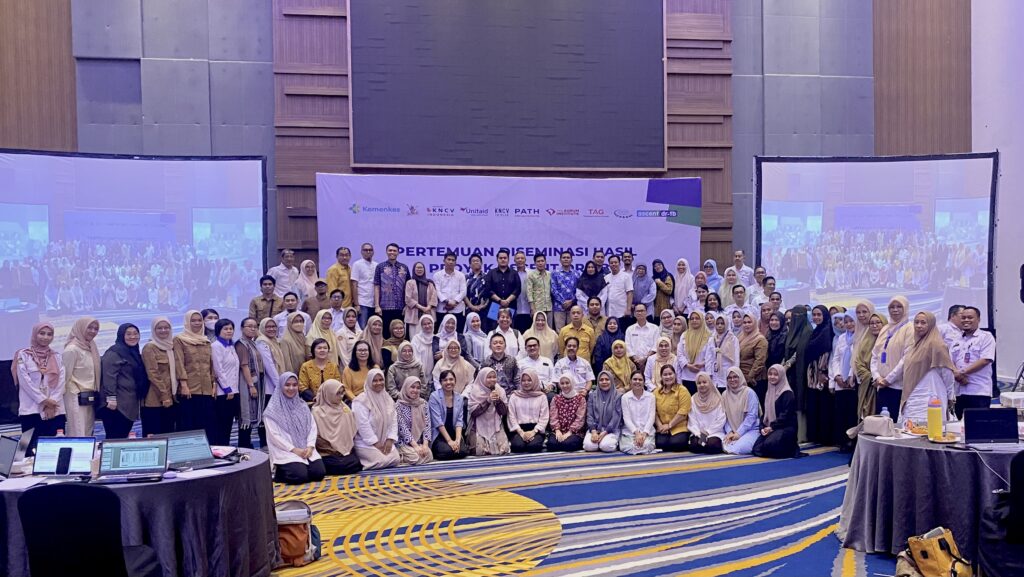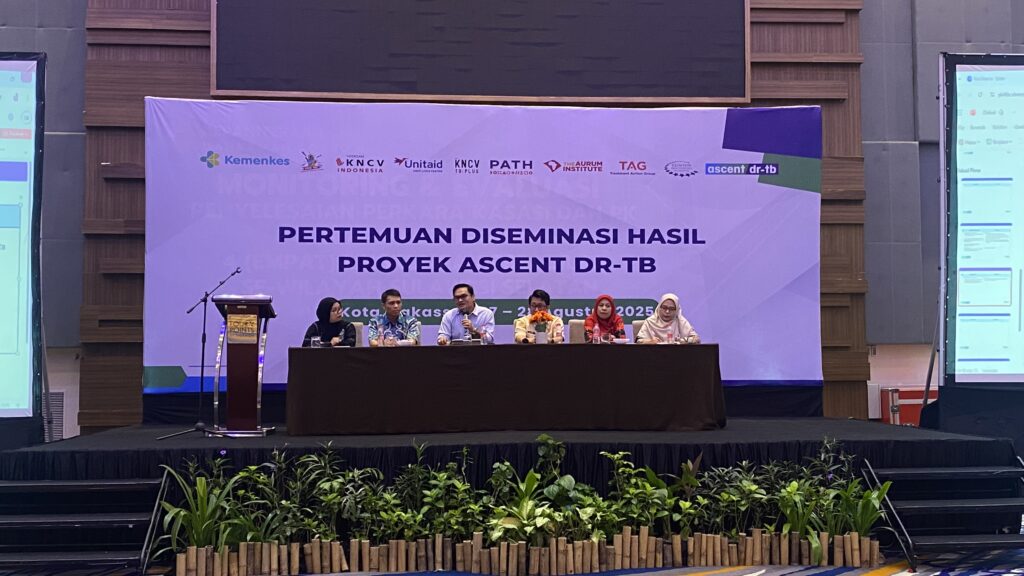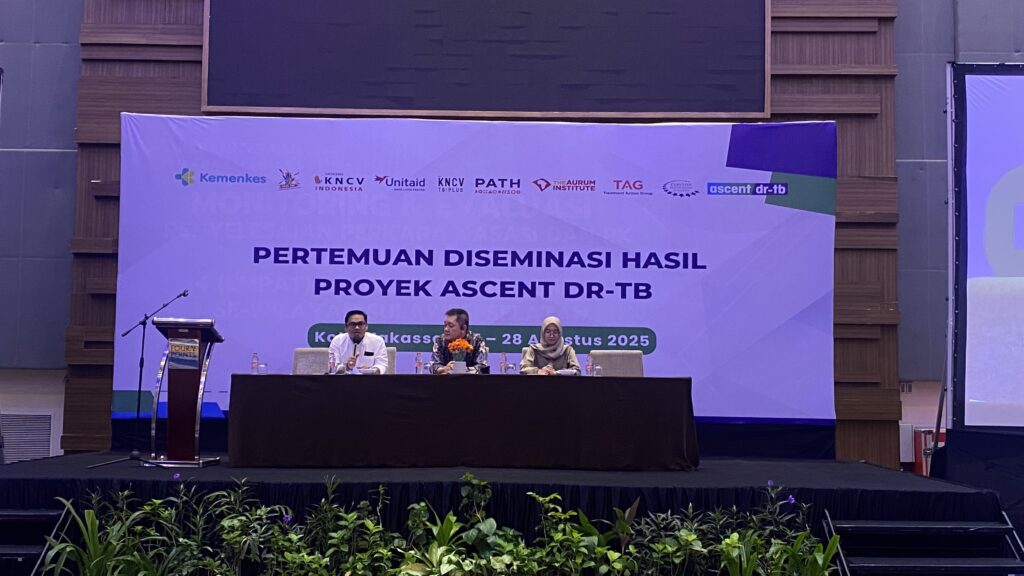More than 120 health leaders, policymakers, and community representatives gathered in Makassar, South Sulawesi for the dissemination of the ASCENT DR-TB Project results in Indonesia’s fight against drug-resistant tuberculosis (DR-TB).
About the ASCENT DR-TB Dissemination Meeting in South Sulawesi
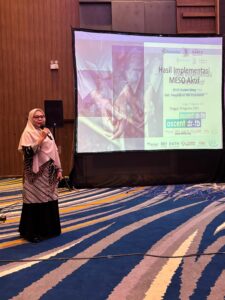
The two-day hybrid meeting, held on 27–28 August 2025, brought together community representatives, officials from the Ministry of Health, provincial and district health offices, and 74 DR-TB facilities to reflect on progress and chart the way forward.
The meeting aimed to:
- share project achievements,
- review challenges in DR-TB management, and
- identify strategies to strengthen active drug-safety monitoring (aDSM) and DR-TB service quality across South Sulawesi and beyond.
Turning data into impact
Opening the event, Dr. Jhon Sugiharto, MPH, Executive Director of Yayasan KNCV Indonesia (YKI), highlighted four key interventions that have driven success: capacity-building, technical assistance for active drug-safety monitoring (aDSM), digital consultation platforms, and patient adverse events (AEs) monitoring tools. These innovations have already delivered results: three districts (Makassar, Gowa, and Pangkep) achieved 100% daily reporting, with lessons now being replicated across 21 other districts.
Representing the South Sulawesi Provincial Health Office, Muhammad Yusri Yunus, SKM., M.Kes, Head of Disease Prevention and Control Division, stressed the importance of sustaining aDSM implementation through ASCENT DR-TB as an innovation for the management of side effects in DR-TB care. He reiterated the province’s political commitment to eliminating TB, backed by the governor and local mayors.
Policy and programmatic context: Urgency and opportunity
Indonesia remains the world’s second-highest TB burden country, with only 47% of cases detected and notified by August 2025, according to the National TB Program Situation and Policy. Dr. Triya Novita Dinihari emphasized the urgency of reducing TB incidence by half as part of President Prabowo’s “quick win” agenda.
While South Sulawesi has pioneered aDSM as a pilot province, challenges remain. Treatment success rates stand at just 58% nationally (46% in the province), with systemic barriers including delayed treatment initiation, complex referral pathways with the national health insurance (NHI), patient refusal and weak adherence monitoring.
Provincial milestones
Despite these challenges, Dr. Andi Julia Junus, SKM., M.Kes from the Provincial Health Office presented the aDSM Achievements in South Sulawesi:
- Roll out of the BPaL/M regimen across facilities by February 2025 and achieved 86% treatment enrolment in the province.
- aDSM reporting in the three intensive districts reached 100%, with a decline in severe side effect reports.
- Stronger laboratory network (89 GeneXpert, 23 XDR GeneXpert, 2 PCR, 1 culture/DST) and DR-TB facilities (29 hospitals, 15 initiating primary health centres).
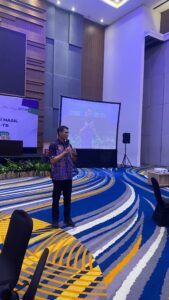
Dr. Yeremia Prawiro Mozar Runtu, MKM, Associate Director of YKI presented the ASCENT DR-TB Technical Assistance Results, highlighting:
- Training of 147 health workers and technical supervision and data validation from 74 health facilities.
- Engagement with patients through daily AE forms with reporting in Makassar, Gowa, and Pangkep improved dramatically to 100%.
- Recommendations based on lessons learned, among which he mentioned:
- Peer-to-peer learning,
- Integration of aDSM supervision with clinical audits,
- Use of aDSM job aids for monthly patient monitoring.
Frontline innovation
On the second day, representatives from health facilities shared good practices that are reshaping patient care:
- Dr. Disman S. Kasim (DR-TB Expert Team) from Pelamonia Hospital, Makassar, presented the introduction of SiMESO, a Google-based digital tool for patient self-reporting of side effects, validated through telemedicine.
- Fatmawati, S.Kep., Ns. (Nurse, DR-TB Program Lead) from Pallangga Health Center, Gowa, explained the pioneering of monthly follow-up screenings health facility (puskesmas) level, including EKG, visual screening, peripheral neuropathy screening and mental health checks, reducing reliance on referral hospitals.
- Amanah Restuyana Zainal, S.Kep., Ns., M.Kep (Head of Nursing Services Division) from Batara Siang Hospital, Pangkep, shared practices that enhanced their DR-TB services, including strong managerial support, provision of diagnostic tools, and fast-track systems for patients.
Looking Ahead
Closing the meeting, Muhammad Yusri Yunus, MKM., M.Kes called on other 21 districts in South Sulawesi to adopt the proven practices from the three intensively supported districts, ensuring sustainability beyond the ASCENT DR-TB project.
Key lessons highlighted include the need for ongoing mentoring and audits to institutionalize aDSM, robust data validation for credible national reporting, person-centred digital tools like SiMESO, and strong managerial commitment to sustain improvements.
A Replicable Model for Indonesia
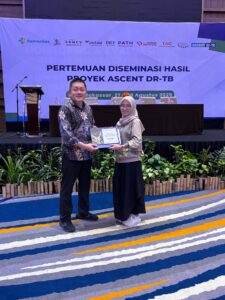
The work conducted under the ASCENT DR-TB project has demonstrated that with collaboration, innovation, and community engagement, DR-TB care can be transformed. South Sulawesi’s experience now offers a model for other provinces, providing a replicable pathway for Indonesia to move closer to its TB elimination targets.

